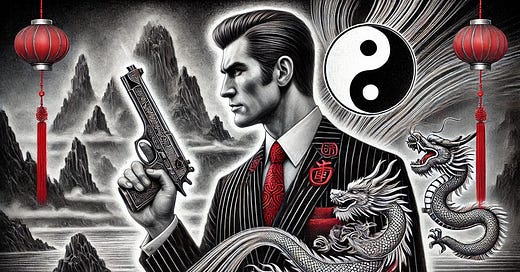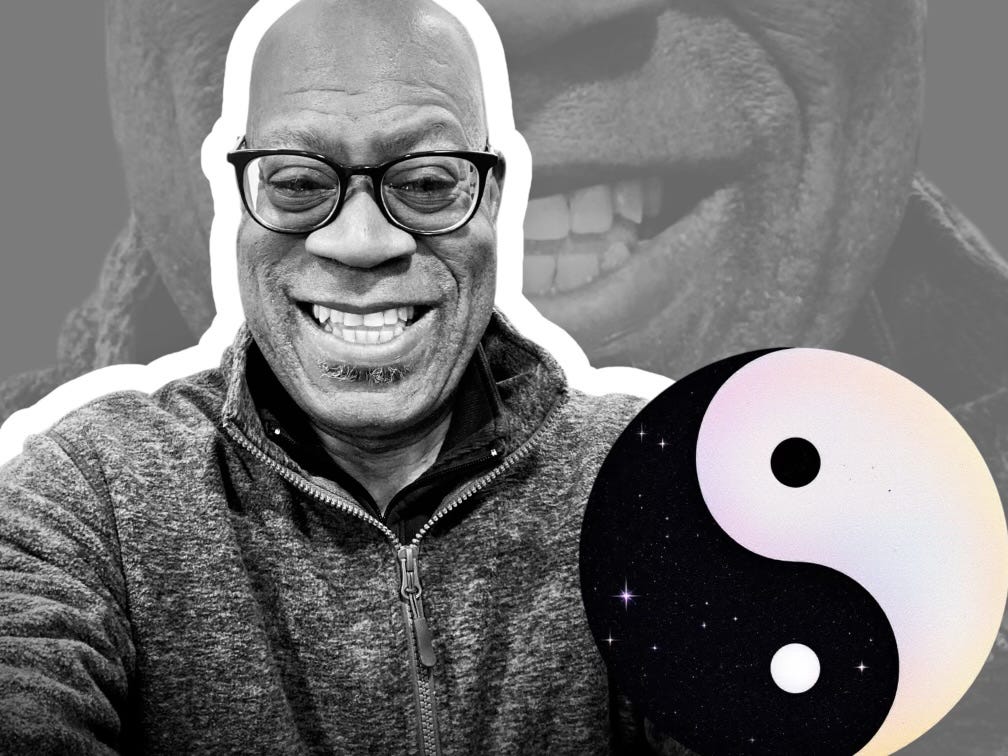Power, Greed, and the Illusion of Control
What The James Bond Movie “Goldfinger” Might Teach Us
Recently, I had the opportunity to watch the 1964 James Bond classic Goldfinger. And oh my, what a dazzling spectacle of Cold War espionage, larger-than-life villains, and mid-century swagger.
It is, in many ways, the quintessential Bond film—the template from which all others took their cues. Sean Connery is at the height of his powers, exuding effortless cool.
Auric Goldfinger, the eponymous villain, is a capitalist megalomaniac obsessed with wealth and domination. And in the center of it all, Bond navigates danger, seduction, and the ever-present threat of death with a detached, may I say, Taoist ease.
But what happens when we strip away the tuxedos, the Aston Martin, and the gold-plated fantasies? What might Goldfinger reveal when viewed through the lens of the Tao Te Ching and the I Ching?
How do Taoist thinkers Mencius and Zhuangzi—two of China’s greatest philosophical minds—illuminate its deeper themes? Beneath the gloss of its 1960s charm, Goldfinger is a meditation on power, fate, and the eternal folly of grasping too tightly at life’s treasures.
Goldfinger’s Greed and the Fallacy of Control
At the heart of the film is Auric Goldfinger, a man whose very name screams excess and obsession. Goldfinger’s plan is not merely to steal from Fort Knox, but to irradiate its gold supply, rendering it useless and increasing the value of his own hoard.
It is not enough for him to be wealthy—he must control the market, bending the world to his will. This, of course, is the ultimate folly in both Taoist and Confucian thought.
Laozi, the legendary sage of the Tao Te Ching, warns us against attachment and the hunger for control:
“The more you grasp, the less you hold. The more you sharpen, the sooner it dulls.”
Goldfinger is the embodiment of this principle turned upside-down. He is a man obsessed with accumulation, yet his obsession is his undoing. In seeking to dominate the world’s gold supply, he loses everything—including his life.
This in my view aligns with the wisdom of the I Ching, which teaches that when one moves too far out of alignment with the natural order, fate inevitably corrects course. Goldfinger’s excess, his non-Taoist grasping, ensures his own downfall.
Bond as the Wu Wei Warrior
James Bond, by contrast, is an embodiment of wu wei—the Taoist concept of effortless action. He does not fight against the current but flows with it.
Unlike Goldfinger, Bond is not obsessed with control. He does not plot or grasp for power; he simply responds to events as they unfold.
In scene after scene, Bond survives not by brute force but by adaptability. Whether it’s his escape from Goldfinger’s laser beam or his ability to manipulate Pussy Galore into switching allegiances, Bond thrives because he moves with the energy of the moment.
Zhuangzi, the great Taoist sage, would appreciate Bond’s improvisational nature. In Zhuangzi’s famous parable of the butcher, a skilled cook carves meat by sensing the spaces between the bones rather than hacking away forcefully. Likewise, Bond moves with precision, understanding when to push and when to yield. He embodies the principle of ziran—natural spontaneity.
Contrast this with Goldfinger, who is rigid, predictable, and weighed down by his own greed. He does not flow; he forces. He does not adapt; he demands. In the end, it is his inability to surrender to the natural rhythm of events that leads to his spectacular demise.
What Would Mencius Say? The Ethics of Bond’s World
Mencius, the Confucian philosopher who emphasized the innate goodness of human nature, would likely find Bond’s world deeply troubling. Goldfinger presents a universe governed by deception, violence, and lust. It is a world where the strong prey on the weak, and moral ambiguity reigns.
Yet, even in this cynical world, Bond represents a certain code—an internal compass that aligns, however loosely, with Mencian virtue. Bond is no saint, but he possesses an instinctive sense of justice. He does not kill indiscriminately. He does not seek power for himself. He follows his duty and maintains a certain ethical restraint, even in a world where morality is fluid.
Mencius argued that human beings are like seedlings bending toward the light—naturally inclined toward goodness if given the right conditions. Perhaps Bond, in his own way, is one of these seedlings. He operates in a corrupt world, but he does not become corrupted. He may indulge in vice, but he does not lose himself in it.
The I Ching of Goldfinger: Hexagram 43 – Breakthrough
If we were to cast the I Ching for Goldfinger, we might arrive at Hexagram 43: Kuai, often translated as Breakthrough or Resoluteness. This hexagram speaks of a decisive moment when corruption must be purged, when falsehood must be exposed. It warns of a need for clarity, decisive action, and an awareness that unchecked ambition will lead to downfall.
Goldfinger, in his blindness, ignores these warnings. His hubris ensures his destruction. Bond, on the other hand, embodies the wisdom of the hexagram. He moves decisively yet does not force. He acts, but not out of personal desire. He simply aligns himself with the flow of events, becoming the necessary instrument of fate.
The Tao of 007
Goldfinger, in my humble opinion, is not just a thrilling spy movie—it is a meditation on power, greed, and the illusion of control. Goldfinger grasps too tightly and loses everything.
Bond on the other hand flows and survives. From a Taoist perspective, the lesson is clear: The tighter we cling, the more easily things slip through our fingers. The more we force, the more resistance we create.
Perhaps that is why Bond endures, why his legend continues to capture our imagination. In a world of chaos, he reminds us to move lightly, to respond rather than react, to master the art of wu wei. He teaches us, in his own suave way, the ultimate lesson of the Tao:
Sometimes, the best way to win is simply to let go.
We can all agree that there are some tough times in front of us. So if you find my nomadic wisdom valuable in helping to set a positive tone for your day, please join me as a paid member supporter at only $6.00/month or $60.00/year.
Or, tip me some dirty chai latte love here, if you feel so inclined.
Every bit counts as I strive to deliver high quality feature articles into your inbox on a daily basis. Never any paywalls, just my Taoist raw thoughts which are open to everyone on what it means to be human.
Your contributions are appreciated in support of my full time work and calling.
Much Love,
Diamond- Michael Scott — aka The Chocolate Taoist
PS: Here are a couple of other simple ways you can support others while supporting yourself
Reshare your favorite takeaway on Substack NOTES
SHARE this article and publication 👇
Join and promote my new Chocolate Taoist “Nomadic Wisdom Journaling Program” HIGHLY RECOMMEND 💥







I am so happy to have this comparison this morning. Thank you for bringing Bond back as a memory from my past. I am going to think more on this.
Hmmm…it’s too bad I can’t think of a single parallel to the current day 🤣